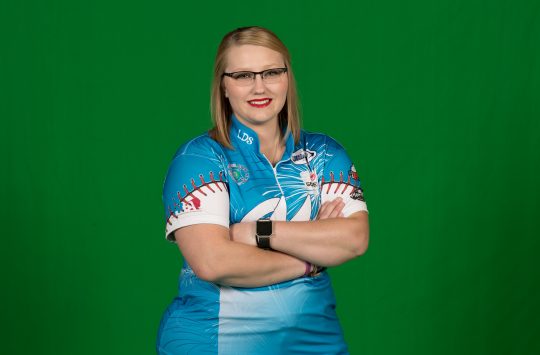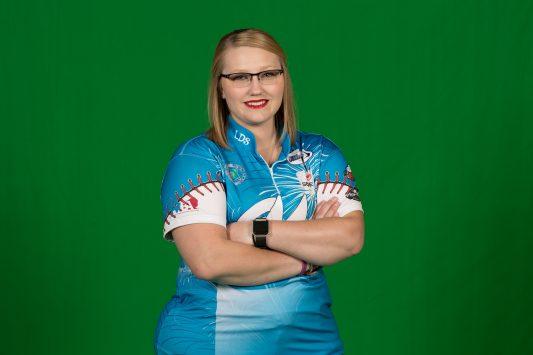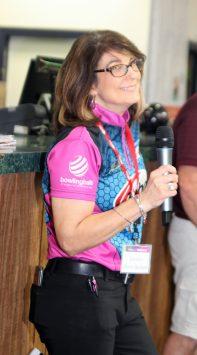Bowling’s diversity problem: Why are there so few women coaches or PSOs?

BY MARK MILLER AND GIANMARC MANZIONE
Numbers often speak louder than words. In bowling today, some numbers speak volumes.
Consider this number, for instance: Of the 73 attendees at the World Bowling Coach Conference in Arlington, Texas, in May, only six were women, which included two presenters. Or this one: Of the more than 640 members of the International Bowling Coaches and Instructors Association, only about a dozen are female.
While there are plenty of women who own or manage centers, serving as league and youth coordinators, and working in office and financial positions, those numbers raise a question: Why aren’t there more women coaches or pro-shop operators in the sport of bowling?
The many people who spoke with BJI for this story, most of them high-profile women within the bowling industry, proposed at least as many answers to that question. Yes, the perception that women can’t coach men is one. Another is the lingering stereotype that the pro shop business is a man’s job.
In coaching, there’s evidence of a lack of and denial of opportunities, and the need for women to seek existing opportunities more aggressively than men. For pro shops, odd hours and low pay are factors.
 Former collegiate All-American Gabriella Mayfield wrote her Master’s thesis on the lack of women head coaches in all NCAA women’s sports.
Former collegiate All-American Gabriella Mayfield wrote her Master’s thesis on the lack of women head coaches in all NCAA women’s sports.
With few female high school and college athletic directors, hiring decisions usually are made by white males who have tended to choose males. Gabriella Mayfield believes such bias was the reason she wasn’t hired at Valparaiso University in Indiana two years ago.
Mayfield, a former collegiate All-American at Central Missouri State University, moved to Valparaiso in the fall of 2015 to work on a Master’s degree in sports administration and also to serve as the assistant coach under then-head coach Matt Nantais. When Nantais left the next year for Louisiana Tech University, she became the interim coach, handling all the logistics in addition to guiding the teams.
But after interviewing for the permanent position early in 2017, she lost out to Shon Washington, who had left the program in 2012. Mayfield said she believes she wasn’t hired because she was too young of a female (22) even though she was a Silver coach. While she heard Washington was fired for making some type of disparaging remarks, the former school official who helped make the hiring decision says that’s not true.
“Shon left on great standing. That’s one of the reasons we brought him back,” said Stephen Anthony, who as Valparaiso’s senior associate director of athletics oversaw the women’s bowling program before moving to Michigan State University as associate athletic director for sports management. He coached Valpo’s women’s bowling program in its first year in 2009-2010, then elevated Washington from assistant coach to head coach.
“Our coaching job was part-time and he resigned for a better work-life balance,” Anthony added. “There are lot of reasons that go into a decision to hire a coach. I don’t remember all the details of why athletic director Mark LaBarbara and I selected Shon but I can tell you he was the best candidate and we were excited to have the opportunity for him to come back and lead our program.”
Mayfield left Valpo shortly thereafter because of the disrespect she felt. She finished her Master’s online while moving back to her hometown of Lake Isabella, Calif., where last year she and her parents Dan and Chris bought and re-opened the eight-lane Mt. Mesa Lanes in nearby Mountain Mesa, which was closed for more than a year after wildfires swept the area. She runs the small pro shop while also serving as youth coach.
Mayfield also happens to have written her Master’s thesis on the lack of women head coaches in all National Collegiate Athletic Association women’s sports.
“It all goes back to the AD,” she said. “They look at a woman and they still think in the 1950s way of thinking. ‘Oh, they’re lower than us. They don’t know what they’re talking about. They’re just a girl.’”
Susie Minshew, a Gold Level coach from Alvarado, Texas, has a different take. After starting her on-lanes bowling career in the early 1980s, she decided she wanted to learn more about the sport, learning as much as she could until she became a full-time coach of individuals.
Minshew spoke about the topic at the World Bowling Coach Conference, saying it’s a combination of knowing about the opportunities out there and going out and grabbing them. She pointed to examples such as Helen Duval and Jeannette Robinson, two women who were coaching pioneers and didn’t take no for an answer.
 "I think a lot of women don’t realize that coaching is a genderless vocation," says Gold coach Susie Minshew.
"I think a lot of women don’t realize that coaching is a genderless vocation," says Gold coach Susie Minshew.
“You need to make your own opportunities just like I did,” Minshew said. “Don’t tell me you can’t do it because you are just who I step around. That is not necessarily the personality of everyone nor should it be. There’s lots of room for coaches. Look at all the bad bowlers out there, so much opportunity for coaching — women coaches. I think a lot of women don’t realize that coaching is a genderless vocation.
“I just shake my head knowing all the places we could be and all the differences we could be making. There are still prejudices, like when I first started I didn’t have any men clients. But the women would come. Then they would get better and start bringing their husbands and they would know everything I told the wife because that’s what I passed along. So now I have a lot more males. You have to get over the, ‘She’s just a girl, she doesn’t know anything’ mentality.”
One of the highest-profile women coaches ever has been Jeri Edwards, who for several years led Team USA, a major factor in her induction into the USBC Hall of Fame this year. One player she coached was Steve Kloempken, now Director of Marketing Storm.
“She was as tough as nails,” Kloempken said. “I loved having Jeri behind me on the lanes. She was a fantastic coach. But at that time you didn’t really see a lot of women in college bowling.”
Kloempken also worked for Kathy Wodka, a Team USA 1987 member who oversaw the pro shop at Sam’s Town in Las Vegas. Back then, she was among the few female pro shop managers to emulate.
“She taught me a lot when I was there. She was really instrumental in helping me understand not just the ball drilling aspect but how to run a pro shop,” Kloempken said. “The whole business side of it I learned from Kathy Wodka. I learned a lot of drilling and fitting techniques from Kathy there.
“For years and years the bowling centers have had a lot of league coordinators, night managers, and assistant managers who have been ladies. But I just wonder if that’s the role they see people are taking and assume that’s for them. They think, ‘I don’t see women working in the pro shops so I don’t see myself working in the pro shop.’”
 IBPSIA charter member Bev Ullrich says that, "For years, when I went to a seminar or a trade show, I was the only woman there."
IBPSIA charter member Bev Ullrich says that, "For years, when I went to a seminar or a trade show, I was the only woman there."
Bev Ullrich, an IBPSIA charter member and 32-year veteran of the pro-shop business who operates Bev's Pro Shop inside Seminole Lanes in Seminole, Fla., said, "When I first started, there were a lot of guys who would walk in the door and then walk back out. “I’m not having a woman drill my ball.” You don’t really see that today. It’s rare.
"There still are not very many women pro-shop operators, though," she added. "For years, when I went to a seminar or a trade show, I was the only woman there. Even when I went to college — I went to Vincennes and I have a degree in bowling management — I was the only girl in my class the first year. It was thirty-five guys and me. Today, I don’t know why more women don’t get into the business. To me, this is not like coming to work. I mean, there are days that it is, but for the most part I’m glad that I’m coming to the bowling center every day.
PWBA legend Tish Johnson, who operates multiple pro shops in Colorado with business partner Melanie McAllister, said she too has encountered the attitude that ball drilling is a man's occupation.
“I had a gentleman come in years ago who looked at me and said, ‘Where’s your ball driller?’ I said, ‘You’re looking at her.’ He said, ‘Well there’s a guy who works here.’ I said, ‘Yeah, he’s one of our employees.’ I told him I’ve been a pro bowler for over 25 years; I think I’m really good at what I do. And he goes, ‘I’ll come back when the guy’s here.’
“Then he asks me my name and comes back an hour later and says, ‘Why didn’t you tell me who you were?’ And I said, ‘I shouldn’t have to.’ I guess he Googled me. I said, ‘Sir, there’s the door. You are welcome to wait until one of my employees is up here and have him drill it for you.’”
That man ended up having Johnson drill his new ball after she watched him bowl. He later shot 300 … and thanked her with cupcakes.
“I just don’t think men think the women know what they’re doing. They’re fragile or they’re petite or they’re okay but they’re not a Blanchard or a Belmo or a Patrick Allen or a Del Ballard Jr. I’m hands-on, Carol Norman is hands-on, Anne Marie is hands-on. Why not have a woman teach you?
 PWBA legend Tish Johnson, who operates several pro shops in Colorado, said, “I just don’t think men think the women know what they’re doing. They’re fragile or they’re petite or they’re okay but they’re not a Blanchard or a Belmo or a Patrick Allen."Some think the lack of women pro shop owners is due to the nature of business itself — drilling bowling balls is very technical and mechanical and often very dirty. Plus the hours aren’t conducive for women with children. And the income is not as good as other positions.
PWBA legend Tish Johnson, who operates several pro shops in Colorado, said, “I just don’t think men think the women know what they’re doing. They’re fragile or they’re petite or they’re okay but they’re not a Blanchard or a Belmo or a Patrick Allen."Some think the lack of women pro shop owners is due to the nature of business itself — drilling bowling balls is very technical and mechanical and often very dirty. Plus the hours aren’t conducive for women with children. And the income is not as good as other positions.
“There’s not many women mechanics for your automobiles. There are some where there used to be none, but I don’t think being a mechanic and doing those things is something still thought of as a viable option for a career for women,” said Barb Chrisman, who co-owns Storm with husband Bill. “There’s not too many women signing up to go to the Porsche mechanics school to be a mechanic.”
Interestingly, Chrisman is the only woman executive in her company because women don’t apply for other roles.
“When they are available we hire them. I’ve told Bill we don’t have anyone in the executive team that are women, but in the last 20 years nobody on the executive team has left,” she said. “I don’t think women have it on their mind. As they are coming up in bowling, you have to have somebody who mentors you or be someplace where the pro shops are strong enough that it looks like a lucrative business to go into.”
While Lori Mraz, owner of Tubro-2-N-1 Grips, works with plenty of women on the distributor level and in manufacturing, she’d like to see more elsewhere. She’s hoping some of the current generation of women bowlers who have competed at her company’s annual Turbo Tech events will be those people.
“They are engaging with us manufacturers, so we hope to utilize them in the future,” Mraz said. “But there’s a lot to learn. So time will tell where these women gravitate to in the industry. Some of these women are putting themselves in positions where you may see them take on more of a leadership role with a manufacturer or elsewhere in the bowling business.”
One woman who has transitioned from competition and coaching to the corporate side of the industry is USBC Hall of Famer Carolyn Dorin-Ballard, who is Turbo Tech’s regional sales manager.
“I think it’s the old mentality of the pro shop operator as ‘the guy’ in the bowling center, that a guy ran the pro shop and was the owner,” she said. “I do think over the years though there have been several women mentored to run pro shops like Carol Norman, like Michelle Rakow. Yet they still are so far and few between.”
Like Minshew, Dorin-Ballard believes it will take more women speaking out without fear of backlash to change that equation.
“I think we’re mentored and given some assistance and guidance but I do think it’s up to the women to really step forward,” she said. “I feel we need to be a little bit more pushy as to what we want.”
Despite the negatives, there’s reason for excitement ahead. As more schools add NCAA and National Association of Intercollegiate Athletics women’s programs, there are more opportunities for women. And with the resurrection of the Professional Women’s Bowling Association, there’s a new crop of females who are smart and savvy enough to fill them.
 Carolyn Dorin-Ballard believes it will take more women speaking out without fear of backlash to improve their representation in pro shops and in coaching.
Carolyn Dorin-Ballard believes it will take more women speaking out without fear of backlash to improve their representation in pro shops and in coaching.
“There are many, many women who can run a pro shop and can drill a ball that can coach or be head coaches of national teams,” Dorin-Ballard said. “They just need to be given the opportunity and encouragement to go run with this program. That’s why I’m excited about what I’m seeing in the NCAA collegiate arena, where a lot of the coaches who were male have opted to transition an assistant from the ranks of a team player who has graduated and will eventually take over that program. I think that’s extremely encouraging.”
Nichole DePaul-Miller, a high-school chemistry teacher as well as a long-time bowler and former employee at Bowling Headquarters in Wisconsin and Kegel in Florida, now is one of those encouraging examples after being hired to start the women’s and men’s program at Upper Iowa University. She and husband James Miller also opened a pro shop inside Plainfield Lanes near Chicago in January.
She believes most people think of bowling as a male-dominated industry, but she also sees more female coaches at NCAA-level schools and more male coaches of USBC club programs today.
“When I entered the industry in 2000, I looked around me and thought, ‘I’m the only chemist at USBC that’s female working on the technical side,’” said DePaul-Miller, who is spending this year recruiting in advance of coaching next year. “I think sometimes women are afraid to get into the pro shop business because it may not bring in enough money or because of the hours.
“A lot of them don’t realize this is an option in terms of being in the industry. If you’re not bowling as much anymore, you can work in a pro shop, learn all the intricacies of bowling balls and technology and layouts and those things.”
Long-time Team USA member and current PWBA star Diandra Asbaty, who coaches about 40-50 people at Diversey River Bowl in north Chicago, thinks the lack of women stems from a lack of awareness.
“It’s so dominated by male presence that maybe it is a little intimidating for men to have the courage to bring in women,” she said. “There certainly are enough qualified, smart women who could do it but maybe they haven’t been as accepted as one would like them to be. They’re not drawn to it.
“There are so many really good collegiate women graduating like Shannon O’Keefe and Josie and Kayla Bandy who are great coaches,” she added. “So I think there’s a shift happening and I’m excited about it. I think it’s definitely moving more to accepting women on the coaching front and maybe it will dip into pro shops.”





